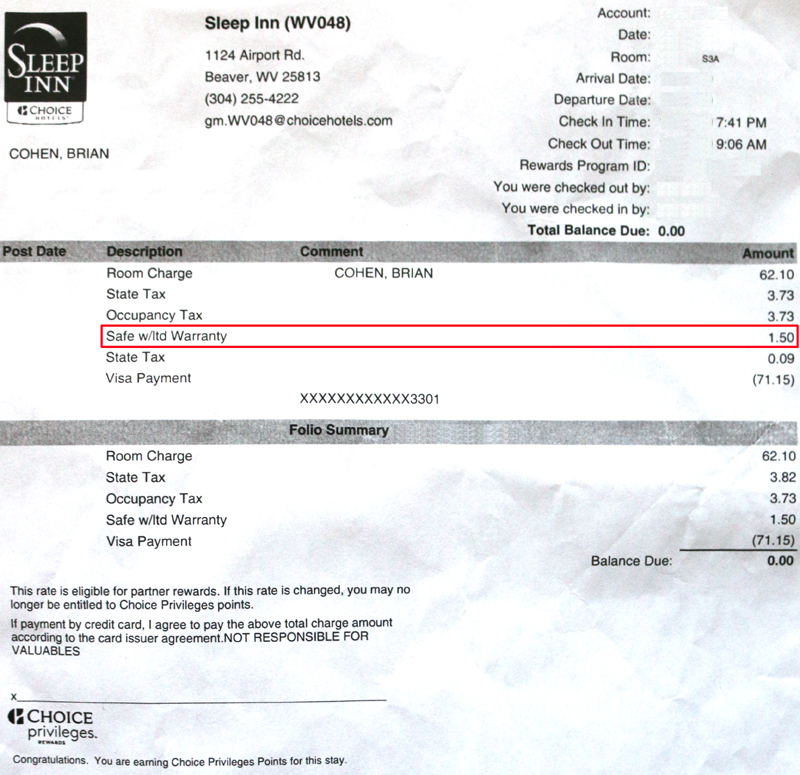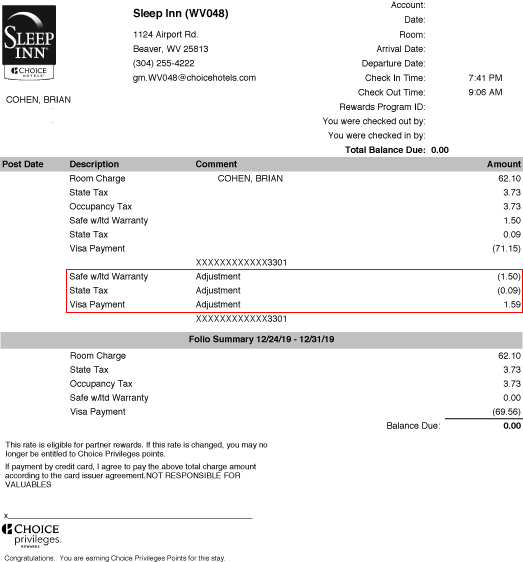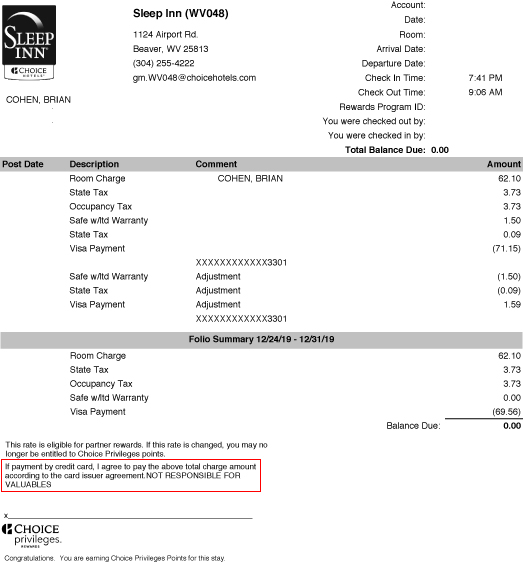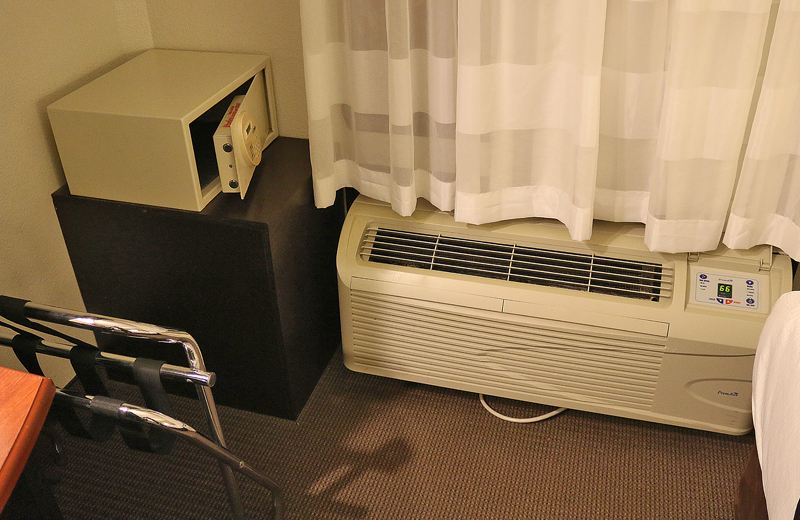You might have noticed that the math did not quite add up when you read this article which I wrote pertaining to being charged $1.50 for use of a safe — with limited warranty — in addition to my room rate and tax when I stayed at the Sleep Inn Beaver – Beckley hotel property in West Virginia.
Wait: Hotel Charges Use of Safe Plus Tax — But Not Responsible For Valuables?!??
The initial estimated total for the room when I reserved it was $69.55…

…but when I checked out of the hotel property, the total cost for the room was $71.15.
The difference of $1.60 is due to the sales tax of nine cents which was added to the bill. I suppose it was rounded up to ten cents…

…but when I received the revised folio for my stay, I was refunded a total of $1.59 instead of $1.60 for the fee plus tax.
If the hotel property really needs that penny, they can keep it.
However, what I found as an ironic twist is that I was being charged for the use of a safe “with limited warranty” — whatever that means…

…but look at the bottom left corner of the folio, which states in capital letters “NOT RESPONSIBLE FOR VALUABLES” above where the guest is to sign in agreement.
Huh?!?
So Who Cares About $1.60, Anyway?
A guest may see the folio upon checking out and say, “That charge is only $1.60 more. That is nothing. Who cares? I’ll just let it go.”
Let us say that this hotel property has an average occupancy rate of 50 rooms per night. At $1.50 per room per night for the fee of usage of the safe, that totals $75.00 per night of extra income for the hotel property, which becomes $27,375.00 for the year.
That is a sizeable chunk of extra change for the hotel property — even if it is reduced to $10,000.00 per year due to fewer guests or refusal to pay the fee from more than half of the guests.
Meanwhile, the extra share for the government of roughly ten cents per room per night for the fee is as much as $1,642.50 in taxes per year, which is not bad at all.
Summary
So wait a minute: I was being charged for the use of a safe “with limited warranty” — whatever that means — which I did not use at all; but the hotel property is not responsible for valuables? Is protecting valuables the sole purpose of a safe? Am I missing something here?!?
Also, keep in mind that a safe in a hotel room is not the most secure place to store your valuables.
To be charged sales tax on top of this deceptive and worthless fee is adding insult to injury. Perhaps one of the reasons why governments are not quick to resolve deceptive fees — such as mandatory resort fees as one of many examples — is because they do not want to lose their piece of the money pie.
When I called via telephone, the agent at the hotel property eventually agreed to remove the charge from the folio — and although I was appreciative that the charge was easily removed, I should not have had to take the time and effort to call the hotel property in the first place to resolve this issue in my favor.
Worse, nowhere in the booking process was there any indication that guests would be charged a fee of $1.50 for use of the safe — whether or not you actually do use it — and my confirmation via e-mail message of my reservation has the total estimated charges at $1.50 less than my final bill; and nowhere in that e-mail message was the possibility that I would be charged that fee.
Even though guests can decline on paying that fee for the safe at any time during the stay, the agent behind the front desk still should have verbally disclosed it during the process of checking in a guest. Despite the option of the guest to be able to remove the charge from the folio, I maintain that sneaking a fee onto a bill is deceptive at best.
With the advent of mandatory resort fees and fees such as this one for use of a safe, the lodging industry is either greedy, desperate for money — or both, as there have been so many things which are wrong with this one single experience.
Mandatory resort fees are required to be disclosed at some point in the reservation booking process. This fee for usage of a safe was not disclosed at all until the guest physically arrives at the hotel property — and ideally should be required to be disclosed at some point during the reservation booking process even though it is not technically considered mandatory.
Although this fee for usage of a safe is not exactly a mandatory fee, that I vehemently oppose the implementation of mandatory resort fees, facilities fees and destination fees is no secret to you if you have been a reader of The Gate for years — they should either be optional or eliminated altogether — and I will just let this extensive body of work over the years pertaining to mandatory resort fees speak for me…
- Warning: Watch Out For This Deceptively Worthless Fee Sneaking Onto Your Hotel Bill
- Is This Amenity Fee a New Low?
- Resort Fee Class Action Settlement 2019: Your Chance to Get Your Share of Money or Points From Wyndham Hotel Group
- Search Rankings Lowered For Hotels Which Charge Resort Fees: Expedia Group
- Deceptive Hotel Resort Fees: Legislation Introduced to Protect Consumers 2019
- Mandatory Resort Fees Increase at Three MGM Hotel and Casino Properties in Las Vegas
- Hilton Sued For Charging Deceptive Resort Fees by Attorney General of Nebraska
- Resort Fees are Here to Stay, According to the Chief Executive Officer of Marriott International
- The Importance of Not Abusing Trust
- Marriott International Sued For Charging Deceptive Resort Fees by Attorney General of District of Columbia
- One Simple Way to Reclaim That Resort Fee Which You Paid
- Even Worse: Mandatory Resort Fees as Percentage of Room Rate
- Why Are You Surprised That Resort Fees “Provide Real Tangible Value” to You?
- 4 Reasons Why Mandatory Resort Fees May Finally Be Disappearing
- Wait a Minute…A Hostel Which Charges a Resort Fee?!?
- Probe of Hotel Booking Sites Results in Enforcement Action in the United Kingdom
- Is This Flat Sales Tax Really a Mandatory Resort Fee in Disguise?
- Resort Fees: The Database of Lodging Options Which Charge Them
- Is This Secret to Ease the Pain of Paying Resort Fees Viable?
- The Destination Fee Plague Spreads Again — This Time, To…
- Another Way Mandatory Resort Fees are Deceptive
- Caesar’s Entertainment Properties to Increase Mandatory Resort Fees
- Resort Fees; Then Parking Fees: Are Free Drinks in Las Vegas In Jeopardy?
- What is Included in a Mandatory Resort Fee of $160.50 Per Night?
- Legislation Targets “Deceptive” Resort Fees
- New Parking Fees at Hotels: When Mandatory Resort Fees are Not Enough
- I Want In on This Resort Fee Nonsense: Open My Own Resort
- It’s Time to Put the Kibosh on Hotel Resort Fees? Now?!?
- Mandatory Resort Fees Can Add Up to 50% More to Your Room Rate With Useless Amenities
- Mandatory Facilities Fee: A Growing Deceptive Trend in Lodging?
- Help Me List Hotel Properties Here to Fight Resort Fees
- What If Other Businesses Surprised You With the Equivalent of Resort Fees?
- $40 Resort Fee at the Andaz Maui at Wailea Resort Starts June 1, 2015
- Lawsuit Alleges Daily Resort Fee Was Hidden From Room Rate at Booking
- Who Likes Resort Fees? Not Me
- A Resort Fee Added on a $36 Rodeway Inn Room?
Photograph ©2019 by Brian Cohen.

